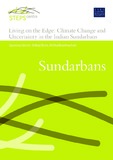Living on the Edge: Climate Change and Uncertainty in the Indian Sundarbans
| dc.contributor.author | Ghosh, Upasona | |
| dc.contributor.author | Bose, Shibaji | |
| dc.contributor.author | Bramhachari, Rittika | |
| dc.coverage.spatial | United Kingdom | en |
| dc.coverage.spatial | India | en |
| dc.date.accessioned | 2018-03-22T15:04:58Z | |
| dc.date.available | 2018-03-22T15:04:58Z | |
| dc.date.issued | 2018-01 | |
| dc.identifier.citation | Ghosh, U., Bose, S. and Bramhachari, R. (2018) Living on the Edge: Climate Change and Uncertainty in the Indian Sundarbans, STEPS Working Paper 101, Brighton: STEPS Centre | en |
| dc.identifier.isbn | 978-1-78118-411-0 | |
| dc.identifier.uri | https://opendocs.ids.ac.uk/opendocs/handle/20.500.12413/13597 | |
| dc.description.abstract | The Sundarbans is a coastal delta and major climate hotspot located at the southern end of Bangladesh and in the state of West Bengal in India. The delta faces significant climatic and other ecological challenges (e.g. disappearing mangrove forest, islands affected by rising sea levels, erratic rainfall and cyclones). While there has been a lot of documentation on climate change impacts and their uncertainties in the Sundarbans, this has largely been from 'above' by experts, natural scientists and modellers. What is missing is how the local islanders view, and live with, these uncertainties and manifestations of climate change and what these mean for their daily lives and livelihoods. This working paper seeks to examine climate change and uncertainty in the context of how diverse actors, especially men and women in the Sundarbans, live with, understand and cope with climate change and uncertainty. The paper demonstrates that even though uncertainties related to climate change are increasing, local people are attuned to living and coping with them. However, climate change uncertainties and other drivers of change are now increasing which is affecting the local people's vulnerability and ability to cope. Largely, the 'above' has tended to ignore local realities and as well as closing down pathways for more inclusive adaptation. Thus, a multiplicity of knowledge and approaches need to be deployed to promote adaptation in the Sundarbans that respond to the socioecological diversity of contexts and is socially just. | en |
| dc.language.iso | en | en |
| dc.publisher | ESRC STEPS Centre | en |
| dc.relation.ispartofseries | STEPS Working Papers;101 | |
| dc.rights | Users are welcome to copy, distribute, display, translate or perform this work without written permission subject to the conditions set out in the Creative Commons licence. For any reuse or distribution, you must make clear to others the licence terms of this work. If you use the work, we ask that you reference the STEPS Centre website (www.steps-centre.org) and send a copy of the work or a link to its use online to the following address for our archive: STEPS Centre, University of Sussex, Brighton BN1 9RE, UK (steps-centre@ids.ac.uk). | en |
| dc.rights.uri | http://creativecommons.org/licenses/by-nc-nd/3.0/ | en |
| dc.subject | Climate Change | en |
| dc.subject | Participation | en |
| dc.title | Living on the Edge: Climate Change and Uncertainty in the Indian Sundarbans | en |
| dc.type | Series paper (non-IDS) | en |
| dc.rights.holder | ESRC STEPS Centre | en |
| rioxxterms.funder | Default funder | en |
| rioxxterms.identifier.project | STEPS Centre | en |
| rioxxterms.version | VoR | en |
| rioxxterms.funder.project | 7360ec74-14f4-4420-af2a-8ca314d07ffe | en |
Files in this item
This item appears in the following Collection(s)
-
ESRC STEPS Centre [225]
Except where otherwise noted, this item's license is described as Users are welcome to copy, distribute, display, translate or perform this work without written permission subject to the conditions set out in the Creative Commons licence. For any reuse or distribution, you must make clear to others the licence terms of this work. If you use the work, we ask that you reference the STEPS Centre website (www.steps-centre.org) and send a copy of the work or a link to its use online to the following address for our archive: STEPS Centre, University of Sussex, Brighton BN1 9RE, UK (steps-centre@ids.ac.uk).


